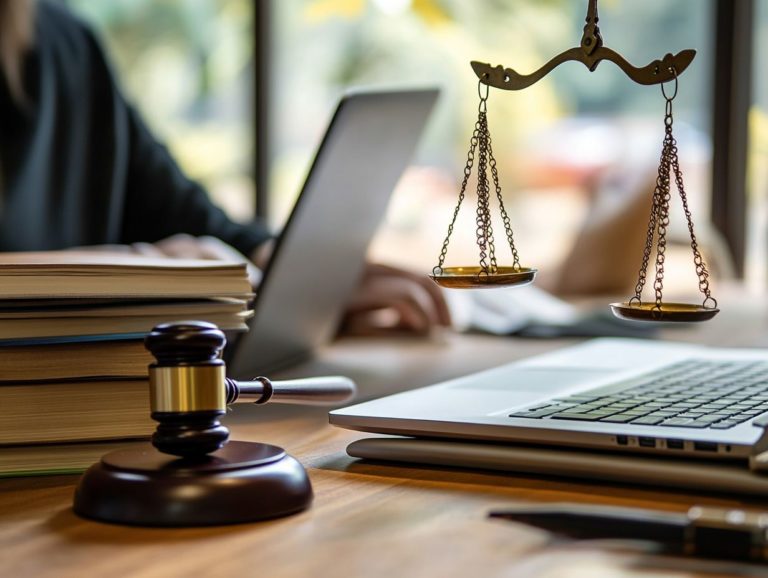5 Ways to Ensure You Choose the Right Attorney
Choosing the right attorney can be a daunting task, especially with so many options at your fingertips. Whether you’re facing a legal issue for the first time or need specialized guidance, understanding your legal situation is essential.
In this article, you’ll discover five powerful steps to empower you in making an informed decision. These steps will help you pinpoint the type of legal assistance necessary and assess an attorney s experience and communication style.
You ll also find insights into common legal needs and fee structures, ensuring you re well-prepared to find the ideal fit for your situation.
Dive in to streamline your search and secure the best legal representation tailored to your needs.
Contents
- Key Takeaways:
- 1. Determine Your Legal Needs
- 2. Research Potential Attorneys
- 3. Check Their Experience and Specialization
- 4. Consider Their Communication Style
- 5. Review Their Fees and Payment Options
- What Are the Most Common Legal Needs That Require an Attorney?
- What Are the Different Types of Attorneys and Their Specializations?
- How Can You Research and Find Potential Attorneys?
- What Factors Should You Consider When Evaluating an Attorney’s Experience?
- Why Is Communication Style Important in Choosing an Attorney?
- What Are the Different Fee Structures and Payment Options Offered by Attorneys?
- Frequently Asked Questions
- What are the five ways to ensure I choose the right attorney?
- Why is it important to research potential attorneys?
- What should I look for when checking an attorney’s qualifications and skills?
- Why is it important to read reviews and testimonials from previous clients?
- Is it necessary to schedule a consultation?
- How do an attorney’s availability and fees factor into the decision-making process?
Key Takeaways:

- Determine your legal needs to make sure you choose an attorney with the right expertise and experience.
- Research potential attorneys and their specializations to find the best fit for your case.
- Consider an attorney’s communication style and fee structure to ensure a smooth and transparent working relationship.
1. Determine Your Legal Needs
Determining your legal needs is a vital first step in understanding your legal situation, especially if you’re part of a construction company facing various legal challenges.
Understanding the broader legal landscape can significantly influence your choice of attorney, helping you learn how to spot a good defense attorney. This ensures you select someone with the expertise required to tackle specific situations effectively.
For instance, within the construction industry, you may encounter common legal issues such as:
- Contract negotiations: discussing the terms of a contract to agree on what each party will do.
- Liability claims: dealing with accusations of responsibility for damages or injuries.
- Zoning disputes: resolving conflicts over land use regulations.
- Regulatory compliance: ensuring adherence to laws and regulations.
Familiarity with these challenges helps pinpoint the right attorney and cultivate a collaborative partnership. This enables your legal professional to provide strategic advice and insights.
This clarity leads to more effective legal representation, enabling you to navigate potential hurdles with confidence.
2. Research Potential Attorneys
Researching potential attorneys is crucial for finding the right professional who can effectively tackle your unique legal needs, whether they pertain to a personal injury case or issues related to your construction company.
Utilizing various online resources to gather information about your options is essential. These may include legal websites and local directories. Don’t underestimate the value of reading lawyer reviews; they provide insight into attorneys’ reputations and past client experiences.
Seeking recommendations from trusted sources friends, family, or colleagues can lead you to reputable attorneys with a proven track record. Evaluating attorney references is equally important. By speaking with previous clients, you gain valuable insights into their experiences and the attorney’s effectiveness in handling cases similar to yours.
This proactive approach will enable you to make a more informed decision.
3. Check Their Experience and Specialization
Evaluating the experience and specialization of an attorney is crucial to ensure they have the necessary legal expertise to handle your case effectively, especially with complex legal matters like personal injuries or construction disputes.
To begin your evaluation, consider their educational background. Where they studied and any honors or distinctions earned during their legal education can say much about their foundation.
It is also essential to identify their areas of specialization. An attorney excelling in personal injury law may not be the best choice for a construction-related issue.
Reviewing their successful track record offers valuable insights into their past performance and the number of favorable outcomes they have secured in similar cases. Ultimately, specialized attorneys who combine experience with a client-focused approach can significantly enhance your chances of achieving a successful resolution.
4. Consider Their Communication Style

Considering an attorney’s communication style is crucial for building a strong relationship with your attorney. It ensures that your legal representation aligns seamlessly with your expectations and needs.
Effective communication clarifies complex legal issues and lays the groundwork for trust. When an attorney articulates legal concepts clearly, you can make more informed decisions.
This understanding fosters collaboration, allowing the attorney to tailor their approach to your unique situation. Strong communication skills can clarify the legal process, making it feel more accessible and less daunting.
Ultimately, a skilled communicator cultivates an environment where open dialogue thrives, fostering a partnership that leads to more successful outcomes.
5. Review Their Fees and Payment Options
Reviewing an attorney’s fees and payment options is essential for making informed decisions about your legal representation. Understanding billing procedures and the potential financial implications for your case is vital.
Familiarizing yourself with various fee structures like contingency fees, hourly rates, and flat fees can significantly help you choose the right legal partner.
Contingency fees mean the lawyer only gets paid if you win the case, which can alleviate some financial stress, especially if you’re worried about upfront costs.
Hourly rates give you a clear view of ongoing expenses, but you’ll need to monitor those billable hours carefully to avoid unwelcome surprises.
Flat fees provide predictability when budgeting for legal services. By grasping these options, you can build trust with your attorney, ensuring that financial matters remain transparent and manageable throughout your legal journey.
What Are the Most Common Legal Needs That Require an Attorney?
Understanding the most common legal needs that require an attorney is crucial, whether you’re an individual or part of a business, like a construction company. This knowledge helps you make better decisions when seeking legal representation for specific issues.
As you navigate complexities such as personal injury claims, contract disputes, or regulatory compliance, you’ll quickly realize that the landscape of legal challenges is intricate.
Each sector presents unique difficulties that can significantly impact your operations and reputation. Access to legal expertise doesn t just help resolve disputes; it also minimizes risks associated with your business practices.
Legal experts will help you navigate the exciting world of laws, ensuring you remain compliant while effectively addressing any emerging concerns.
This strategic approach is essential for fostering sound business practices and maintaining a robust legal standing.
What Are the Different Types of Attorneys and Their Specializations?
Various types of attorneys exist, each with their expertise, making it essential to pinpoint which lawyer aligns with your specific legal needs. For example, if you’re dealing with accident-related claims, hiring a personal injury lawyer is crucial.
Understanding the broad spectrum of legal specializations from family law, which tackles issues like divorce and custody, to criminal law aimed at defending against crimes, and corporate law that navigates business regulations enables you in your quest for legal representation.
Each specialization offers distinct skills designed to tackle specific legal challenges effectively. If you’re facing a custody battle, you’ll want to collaborate with someone knowledgeable in family law. Conversely, if your business is grappling with corporate compliance issues, seeking an attorney with a corporate law background is key.
Being familiar with local regulations further refines your selection process, ensuring you find the most qualified help tailored to your unique situation.
How Can You Research and Find Potential Attorneys?

Researching potential attorneys can be easy if you use trusted sources and online platforms. These resources provide insights into their qualifications and experience with various legal issues.
Start by exploring legal directories that list specialists by practice area. This allows you to filter results based on your specific needs.
Bar association resources offer reliable referrals and insights into local attorneys. They provide a solid starting point for your search.
Don’t overlook social media platforms; they can be great for recommendations and reviews from people who faced similar legal challenges.
Cross-reference any information you gather to ensure the attorney’s credibility. For tips on selecting a qualified lawyer, consider reading about how to find the right defense attorney quickly. Choose an attorney who is experienced and has a solid reputation.
What Factors Should You Consider When Evaluating an Attorney’s Experience?
When evaluating an attorney’s experience, focus on their qualifications and their success in similar cases. Look into the complexity of the legal issues they ve handled.
Consider the attorney’s years of practice and areas of specialization. These details reveal their expertise and how it aligns with your needs.
Successful case outcomes illustrate their effectiveness. This showcases their skill in navigating complex legal situations.
Client testimonials and peer reviews are valuable resources. They provide real-world perspectives on an attorney s professionalism and effectiveness.
These insights help you understand the attorney’s capabilities, enabling you to make an informed decision.
Why Is Communication Style Important in Choosing an Attorney?
The way an attorney communicates shapes the attorney-client relationship. It affects how clearly you receive and understand legal advice, especially during critical case phases.
A skilled attorney knows their words carry weight. They influence both the clarity of legal concepts and the trust built with you.
When an attorney translates complex legal jargon into plain language, you feel more informed about your situation. This understanding fosters collaboration, helping you engage actively in your defense.
An attorney s ability to communicate can lead to your satisfaction and better case outcomes. Informed clients are better equipped to participate in decision-making.
What Are the Different Fee Structures and Payment Options Offered by Attorneys?
Attorneys offer various fee structures, such as contingency fees, hourly rates, and flat fees. Each option can affect your financial commitment to legal help.
Understanding these billing models is key as you navigate the legal landscape. For instance, contingency fees allow you to pay only if the attorney wins your case, which can be helpful if cash is tight.
However, this model might result in a higher total fee. Hourly rates can provide transparency but watch for rising costs in complex cases.
When speaking to potential attorneys, ask about payment structures and any additional costs. This equips you to make informed decisions that fit your budget.
Frequently Asked Questions

Have more questions? Reach out for personalized assistance today!
What are the five ways to ensure I choose the right attorney?
The five ways to ensure you choose the right attorney are:
- Research and gather information about potential attorneys.
- Check their qualifications and skills.
- Read reviews and testimonials from previous clients.
- Schedule a consultation to ask questions and get a feel for their communication style.
- Consider the attorney’s availability and fees.
Why is it important to research potential attorneys?
Researching potential attorneys helps you make an informed choice. You’ll gain insight into their backgrounds and expertise, ensuring they meet your legal needs.
What should I look for when checking an attorney’s qualifications and skills?
When checking an attorney’s qualifications and skills, look for their education, licenses, and any additional certifications or specializations. Also, consider how long they have been practicing law and their success rate in similar cases.
Why is it important to read reviews and testimonials from previous clients?
Reading reviews and testimonials from previous clients provides insight into an attorney’s reputation and handling of cases. You can see what others experienced while working with the attorney, helping you determine if they are the right fit for you.
Is it necessary to schedule a consultation?
It’s highly recommended to schedule a consultation before hiring. This meeting lets you ask questions and gauge their communication style, helping ensure you feel comfortable.
How do an attorney’s availability and fees factor into the decision-making process?
An attorney’s availability and fees are crucial factors in your decision. You want to ensure they can dedicate time to your case and that their fees align with your budget. For more guidance, consider navigating the attorney selection process to discuss payment options and potential additional costs upfront to avoid surprises.






